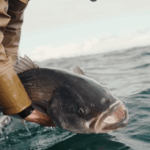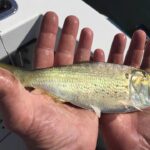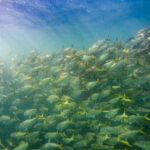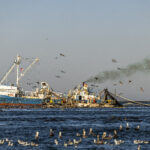
Release Mortality Revisited: New Research from Massachusetts DMF
Feature Photo Credit: Robbie Tartaglia What’s going on? For decades, striped bass management relied on a
By Tony Friedrich, VP/Policy Director
The Vineyard Wind 1 project received final approval on Tuesday, May 11, and construction is planned to begin in 2022 (click here for the full Record of Decision). The project, expected to be completed in 2023, will be the first commercial-scale wind farm in the United States. There are plans for 62 turbines located about 12 miles off the coast of Martha’s Vineyard, which will generate enough power for 400,000 homes.
Click Here for the Full ASGA Wind Policy Platform
Vineyard Wind is just the first of many offshore wind projects that will come under review in the coming years. All told, there have been 16 leases issued for wind development from Massachusetts to North Carolina. The total leased areas cover 1.7 million acres, which is about the size of the state of Delaware. Within a decade, we could see around 2000 turbines off the east coast.
Wind developers, the Bureau of Ocean Energy Management (BOEM), NOAA Fisheries, and the U.S. Coast Guard are working together on these projects. Their combined engagement with the commercial fishing sector has been robust (although the Responsible Offshore Development Alliance, which represents commercial interests, condemned the approval of Vineyard Wind 1). Their outreach to the recreational fishing community has been lacking, but it is starting to gain momentum.
ASGA supports the concept of renewable energy, but we also have concerns. Fundamentally, science is being outpaced by development. First and foremost, these projects must be designed to have the least possible impact to marine ecosystems and fisheries. We also need a commitment to developing the best data possible in the pre-construction phase while following through with continued monitoring during the post construction phase. From our Wind Policy Platform:
ASGA understands the urgent need for offshore wind energy development to proceed in the United States but insists that decision-making be based on the best available science and considerate of diverse stakeholder needs. Balancing the pace of development with the pace of the research and peer review process, coupled with meaningful stakeholder engagement throughout, is key to ensuring that sustainable fisheries, healthy marine ecosystems, and offshore wind power can successfully coexist in U.S. waters.
The recreational community must take an active role as these projects continue to move forward. ASGA is perfectly positioned to facilitate these discussions. Our Executive Director, Dr. Willy Goldsmith, is an Advisory Council member for the Responsible Offshore Science Alliance (ROSA). Our guides work every day around these lease areas. We can combine the science with our on-the-water experience in an honest and meaningful way to ensure that wind and fisheries can coexist.
Make no mistake, these projects are moving forward. ASGA will be there every step of the way, from planning to construction to continued monitoring.

Feature Photo Credit: Robbie Tartaglia What’s going on? For decades, striped bass management relied on a

Recent developments in the 2025 Atlantic Menhaden Stock Assessment Update, released by the Atlantic States

What’s going on? The “most important fish in the sea” just exposed one of the

Mario CampoFisheries Ecologist, Southeastern Louisiana UniversityScience and Policy Associate, American Saltwater Guides Association This discussion
We rely on our members and donations to keep fighting for a sustainable tomorrow in marine conservation.
GIVE THE GIFT OF FISHERIES CONSERVATION THIS HOLIDAY SEASON. SHOP ASGA GOODS THAT FUND FISHERIES RESEARCH & ADVOCACY CAMPAIGNS
JOIN ASGA IN CALLING FOR CRITICAL MANAGEMENT ACTION AFTER YEARS OF SPAWN FAILURES & POOR MANAGEMENT.
By using this website, you agree to our use of cookies. We use cookies to provide you with a great experience and to help our website run effectively. To learn more, please review our privacy policy.
2 Responses